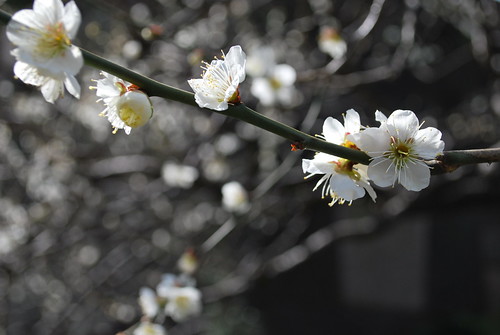
{Photos by rocketlass.}
In my brief tenure as a bookseller in London, I had enough dealings with tiny gift books to send me to the poetry section for a quick flip through the Inferno, on the assumption that somewhere therein Dante had contrived an appropriately creative and hideous punishment for whoever invented the form. Tiny gift books are a horror in every way: they don't stack well; they can't really be shelved, because they disappear when placed spine-out; and they're easily shoplifted. Perhaps worst of all, they tend to represent the gift of last resort: confronted with the task of buying a gift for a nephew he barely knows, the shopper wanders the store for a desultory hour before reluctantly plumping for the harmless and charmless Beyond D'oh! The Wit and Wisdom of Your Favorite Cartoon Characters. They're the airport tchotchkes of book retail, simultaneously loathsome and disposable.
Now New Directions has come out with a couple of books that have forced me to dial back the vitriol: Written on the Sky: Poems from the Japanese and Songs of Love, Moon, and Wind: Poems from the Chinese, both translated by Kenneth Rexroth. They've plucked these slim, well-regarded volumes from their backlist and designed them to be pocket-sized, pretty, and undaunting--and in doing so have, I think, given the books a real chance of breaking out of their natural market and finding new readers. (It couldn't hurt that they've also managed to land at least some of them in non-traditional retail outlets: I recently saw another volume in the series, by Neruda, in Anthropologie, of all places.)
Seeing these books succeed would go a long way towards vitiating my hatred of gift books; New Directions publishes so many of my favorite authors that anything that adds to their bottom line is almost de facto good for literature. But beyond that, these books are simply wonderful on their own merits, and I'm happy to hope that by packaging Rexroth's translations this way New Directions can lead people to unexpectedly discover classical Japanese and Chinese poetry.

Both volumes draw on dozens of authors from throughout each centuries-long tradition and mix forms and styles, the poems in the Chinese volume more varied in approach than those of the Japanese collection, which consists of a mix of haiku and tanka. Murasaki Shikibu turns up three times in the Japanese volume, with this poem in particular seeming a suitable account of the life of quiet observation that is the lot of the novelist:
I feel of others' affairsMy favorite poem from that book thus far is this one, by an anonymous poet (and, frustratingly, undated):
as thought they were
the water birds I watch
floating idly on the water.
My idleness comes
only from sorrow.
Everybody knowsI'm impressed by the suppleness of the shift in perspective in those lines: the love is seen by everyone, but in a way that is perhaps not obvious to the beloved until, gesturing, the poet points it out; you can almost feel the amused flutter of recognition coursing through the beloved.
How much I love you.
All your
Mannerisms
Have Become my
Mannerisms.
From the Chinese volume, I'm particularly struck by this poem, by Ou-Yang Hsiu, who wrote in the eleventh century:
East WindJapanese and Chinese poets of the classical tradition write so well, and so simply, about nature that it's easy to slip into an exoticizing awe, stripping them of their context and viewing them as an admirable class of nature savant--like reading the Romantics without remembering that their work was in part written against the growth of industry. "East Wind" serves as an amusing corrective. After a traditionally descriptive opening, it casually deflates the beautifully seductive scene it's established: the magistrate is minor, he's drunk, and though his appreciation of this quiet scene is real, its hyper-lyrical qualities just might owe as much to liquor as to spring itself. Haven't we all at times felt that ovewhelming warm love for the world and all its creatures, just before we toddle off for an inevitably sobering sleep?
The burgeoning trees are thick with leaves
The birds are singing on all the hills.
The East Wind blows softly.
The birds sing, the flowers dance.
This minor magistrate is drunk.
Tomorrow when he wakes up,
Spring will no longer be new.

On a morning when yet again yesterday's promise of spring has been stolen away by gray skies and chilly rain, it seems appropriate to end the post with these lines from "Spring Joy," by Chu Shu-Chen, who wrote in the twelfth century:
Drafty winds and fine rainI don't expect to do any weeping today, but if I have to put up with another month of this non-spring nonsense, I can't make any guarantees about my fortitude. Those of you in warmer, more reliable climes, enjoy the outdoors for me today.
Make a chilly Spring.
I drink wine, remembering bygone happiness,
Under the pear blossoms,
Weeping with misery.
Once upon a time, New Directions published gift editions of at least a couple of the original Rexorth books - of One Hundred Poems from the Japanese, for example.
ReplyDeleteThese Rexroth mini-anthologies make great sense. But the original paperbacks also make good gifts!